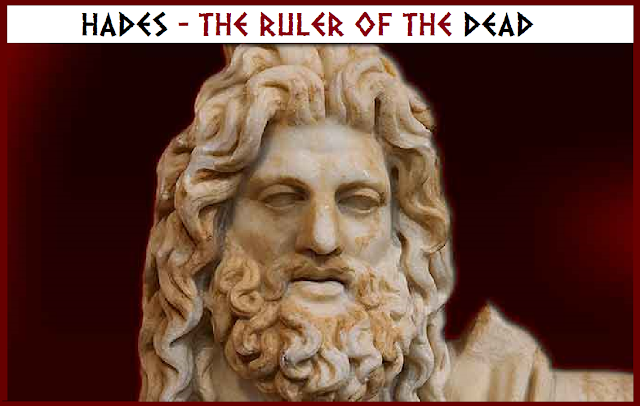In the ancient Greek Religion, Hades ( Άδης) is the God of the dead and the king of the Underworld, with which his name became synonymous. Hades is the eldest son of Cronus and Rhea, although the last son regurgitated by His father. He and his brothers, Zeus and Poseidon, defeated their father's generation of Gods, the Titans, and claimed rulership over the cosmos. Hades received the Underworld, Zeus the sky, and Poseidon the sea, with the solid earth, long-time the province of Gaia, available to all three concurrently. Hades is often portrayed with His three-headed guard dog Cerberus.
Perhaps from fear of pronouncing his name, around the 5th century BCΕ, the Greeks started referring to Hades as Plouton, with a root meaning "wealthy", considering that riches come from the soil below (e.g., fertile crops, metals and so on).
Hades is the first-born son of the Titans Cronos and Rhea. His three older sisters, Hestia, Demeter, and Hera, as well as a younger brother, Poseidon, had been swallowed whole by their father as soon as they were born. Zeus was the youngest child and through the machinations of their mother, Rhea, He was the only one that had escaped this fate. Upon reaching adulthood, Zeus managed to force His father to disgorge His siblings. After their release, the six younger Gods, along with allies they managed to gather, challenged the elder Gods for power in the Titanomachy, a Divine War. The war lasted for ten years and ended with the victory of the younger Gods. Following their victory, Hades and his two brothers, Poseidon and Zeus, drew lots in order to share the different among them. Zeus received the sky, Poseidon received the seas, and Hades received the Underworld; the unseen realm, to which the souls of the dead go upon leaving the world. The Underworld includes all things beneath the earth. Some stories suggest that Hades was dissatisfied with his turnout, but He had no choice and moved to His new Kingdom.
Despite modern connotations of death as evil, Hades is actually more altruistically inclined in Greek Religion. He is often portrayed as passive rather than evil; His role is often to maintain relative balance. That said, He is also depicted as cold and stern, and He holds all of his subjects equally accountable to His laws. Any other individual aspects of his personality are not given, as Greeks refrained from giving Him much thought in order to avoid attracting His attention.
Hades rules the dead, assisted by others over whom He has complete authority. The House of Hades is described as full of "guests," though He rarely leaves the Underworld. He cares little about what happens in the world above, as His primary attention is ensuring none of His subjects ever leaves.
He strictly forbids his subjects to leave his domain and can become quite enraged when anyone tries to do so , or if someone tries to steal the souls from His realm. His wrath is equally terrible for anyone who tries to cheat death or otherwise cross Him.Hades is depicted outside of the Underworld only once, and even that is believed to have been an instance where He had just left the gates of the Underworld, which was when Heracles shot him with an arrow, as Hades was attempting to defend the city of Pylos. After He was wounded, he traveled to Mount Olympus to heal. Besides Heracles, the only other living people who ventured to the Underworld were also heroes: Odysseus, Aeneas (accompanied by the Sibyl), Theseus with Pirithus, and Orpheus. Hades showed unusual mercy towards Orpheus; Persephone had been deeply moved by Orpheus' music and persuaded Hades to let Euridice to her husband, on specific terms. None of those living visitors were were pleased with what they witnessed in the Realm of the Dead.
Hades obtained his wife and queen, Persephone, through abduction at the behest of Zeus. This story is the most important one Hades takes part in; it also connected the Eleusinian Mysteries with the Olympian pantheon, particularly as represented in the Homeric Hymn to Demeter, which is the oldest story of the abduction.
Epithets of Hades include Agesander (Αγήσανδρος) and Agesilaos (Αγεσίλαος), describing Hades as the God who carries away all.
He is also referred to as Zeus katachthonios (Ζευς καταχθόνιος), meaning "the Zeus of the Underworld", by those avoiding his actual name, as he had complete control over the Underworld.
There are several sections of the realm of Hades, including Elysium, the Asphodel Meadows, and Tartarus. This otherwise dark and gloomy place also includes a bit of beauty- the Garden of the Hesperides, often identified with the Isles of the Blessed, where the blessed heroes may dwell.

















Thanks for sharing, nice post! Post really provide useful information!
ReplyDeletebồn tắm nằm
bồn tắm massage
bồn tắm 8, bồn tắm góc
bồn tắm, phòng tắm
Viglacera Platinum
Thiết bị vệ sinh Platinum
Bồn cầu Platinum
Thiết bị vệ sinh Sanfi